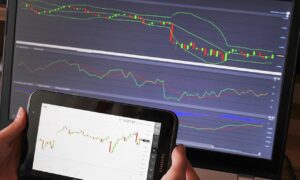Forex trading is a lucrative business for those who know how to do it right. It involves buying and selling currencies in the global market to make a profit. However, to be successful in forex trading, you need a reliable forex broker who will provide you with the necessary trading tools and support. Choosing the right forex broker can be challenging, especially for beginners. In this article, we will discuss how to choose the right forex broker for your trading needs.
Forex trading can be a highly profitable venture, but it requires knowledge, skills, and the right tools and support. A forex broker plays a critical role in providing traders with the necessary resources, including trading platforms, access to markets, educational resources, and customer support. However, selecting the right broker can be daunting, especially for beginners who are new to the forex market. To choose the right forex broker, you need to consider factors such as regulation, trading costs, trading platforms, customer support, and reputation. By doing your research and comparing different brokers, you can find a reliable partner that will help you achieve your trading goals and succeed in the dynamic world of forex trading.
1. Regulation
Regulation is the first thing you should consider when choosing a forex broker. A regulated broker is one that is licensed and authorized by a regulatory body to offer forex trading services. Regulated brokers are required to comply with strict rules and regulations, which protect traders from fraud and ensure transparency. Therefore, it is essential to choose a regulated forex broker to ensure the safety of your funds and protect your interests.
Unregulated brokers may offer enticing bonuses and lower fees, but they may not have your best interests at heart and may engage in unethical practices. In contrast, regulated brokers must meet high standards, including segregating client funds from company funds, maintaining adequate capital reserves, and submitting to regular audits. Regulated brokers provide a channel for dispute resolution, should any issues arise. Overall, choosing a regulated forex broker is crucial for your peace of mind and the security of your investments.
2. Trading Platform
The trading platform is the software you use to execute trades, analyze the market, and manage your account. A good trading platform should be user-friendly, stable, and have all the necessary trading tools, such as charts, indicators, and news feeds. It should also be easily customizable to suit your trading style.
A reliable trading platform should have fast execution speeds, low latency, and a wide range of financial instruments can be traded through Trading CFDs, including stocks, indices, commodities, and currencies. It should provide real-time market data and allow you to place orders directly from the charts. Security is also an important factor, so the platform should have robust measures in place to protect your account and personal information. Overall, a good trading platform can make a significant difference in your trading success and should be carefully chosen based on your specific needs and preferences.
3. Fees and Commissions
Forex brokers earn money through spreads, commissions, and fees. Spreads are the difference between the buying and selling price of a currency pair. Commissions are fees charged by the broker for executing your trades, while other fees may include withdrawal and deposit fees.
Forex brokers, like any other financial institution, need to make money to stay in business. They do this by earning revenue from the trades that their clients place. The three main ways that forex brokers earn money are through spreads, commissions, and fees.
Spreads refer to the difference between the buying and selling price of a currency pair. This is essentially the cost of doing business with the broker. For example, if the buying price for the EUR/USD currency pair is 1.2000 and the selling price is 1.1995, the spread is 0.0005, or 5 pips. This is the amount that the broker earns for facilitating the trade.
Commissions are fees charged by the broker for executing your trades. Many brokers charge a commission on top of the spread, which can add up over time. Some brokers may offer lower spreads but charge higher commissions, while others may offer higher spreads and lower commissions. It’s important to consider both factors when choosing a broker.
In addition to spreads and commissions, forex brokers may also charge other fees. These can include withdrawal and deposit fees, which are charged when you move money in or out of your trading account. Some brokers may also charge inactivity fees if you don’t place any trades for a certain period of time. It’s important to review the fee schedule for any broker you’re considering to make sure you understand all the costs involved.
Overall, forex brokers earn money by charging fees and commissions for the services they provide. As a trader, it’s important to understand these costs and factor them into your trading strategy.
4. Customer Support
Forex trading is a 24-hour business, and you may need support at any time of the day or night. A good forex broker should offer reliable customer support to address any issues you may encounter. They should have multiple channels of communication, such as email, phone, live chat, and social media.
This ensures that you can reach out to them whenever you need assistance or have a query. Additionally, a good forex broker should also have a team of knowledgeable and experienced customer support representatives who can provide prompt and effective solutions to your problems. Therefore, when choosing a forex broker, it is important to consider their customer support services as well, as it can make a significant difference in your trading experience.
5. Trading Instruments
Forex trading involves trading currency pairs, but some brokers also offer other trading instruments, such as commodities, indices, and cryptocurrencies. If you are interested in trading other instruments, you should choose a broker that offers them.
Forex trading is a popular form of investment where traders can profit from fluctuations in currency exchange rates. However, some brokers also offer other trading instruments such as commodities, indices, and cryptocurrencies. This means that traders have the opportunity to diversify their portfolios and potentially earn profits from a range of financial markets. If you are interested in trading other instruments, it is important to choose a broker that offers them. This will allow you to access a wider range of financial products and increase your chances of success in the trading world.
Conclusion
Choosing the right forex broker is crucial for your success in forex trading. A good forex broker should be regulated, have a reliable trading platform, offer competitive fees and commissions, provide excellent customer support, and offer the trading instruments you are interested in trading. By considering these factors, you can find a forex broker that meets your trading needs and helps you achieve your financial goals.



































